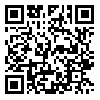BibTeX | RIS | EndNote | Medlars | ProCite | Reference Manager | RefWorks
Send citation to:
URL: http://hakim.tums.ac.ir/article-1-2278-en.html
2- PhD in Health Economics, Professor, Health Services Management Research Center, Institute for Futures Studies in Health, Kerman University of Medical Sciences, Kerman, Iran. ,
Introduction: The best way to control HIV is early diagnosis, which is carried out by fixed centers and mobile HIV testing teams. This study aimed to determine the cost-effectiveness of the process of identifying new HIV cases using rapid diagnostic tests in fixed centers and mobile teams in Chabahar city in 2017.
Methods: In this economic evaluation study, the research population included all mobile HIV counseling and testing centers and teams in Chabahar city, which included 15 fixed centers and 12 mobile HIV counseling and testing teams. In this study, the costs from the perspective of the health system and the outcomes included the number of people identified as HIV-positive and DALYs avoided.
Results: The findings showed that the fixed and mobile centers intervention identified 15 and 27 people with HIV, respectively, and the number of DALYs avoided was 22.55 and 22.49, respectively. The total costs of fixed and mobile centers were 2,522,550,706 Rials and 296,793,703 Rials, respectively. The incremental cost-effectiveness ratio was -22,816,924 Rials, which indicated that the mobile team intervention was cost-effective. The results of the sensitivity analysis showed that ICER was sensitive to the parameter "probability of rapid diagnostic test being negative" in fixed centers.
Conclusion: This study is a suitable guide for health system policymakers to make the right decision and allocate resources optimally for the intervention of mobile HIV counseling and testing teams.
Received: 2024/11/30 | Accepted: 2023/06/19 | Published: 2023/06/19
| Rights and permissions | |
 |
This work is licensed under a Creative Commons Attribution-NonCommercial 4.0 International License. |



